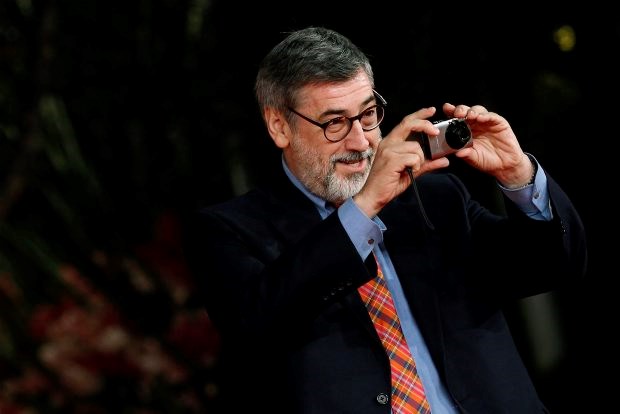After making movies for 40 years, John Landis has learned a thing or two about fear. He explored it in his feature debut Schlock (1971), inventively combined humour and horror in his monster-movie classic An American Werewolf in London (1981) and recently revisited it in his coffee table book Monsters in the Movies: 100 Years of Cinematic Nightmares.
Nothing is as scary as how much movie-making has morphed into a whole new beast in the 21st century, however. So says the prolific director who started as a mailboy at 20th Century Fox before becoming one of Hollywood's most successful commercial directors with megahits such as National Lampoon's Animal House, The Blues Brothers and Trading Places.
Indeed, the fear that propelled the plots of some of his favourite movies now grips studio executives, says Landis, in town for the Victoria Film Festival. He will speak Saturday night at the Vic before a "quote-along" screening of The Blues Brothers.
"It's terrifying," he continues. "What studio would make Midnight Cowboy now, or Chinatown? It's a different business, mainly because it's become so corporate. They now have 'green-light committees' and almost all decisions are now based on fear."
Landis, 61, says he prefers "reactionary" to "conservative" to describe how decisions by today's executives are based on protecting their jobs, which explains the current glut of movies based on toys, games and comic books.
"Paramount had Charlie Bluhdorn, Columbia had David Begelman and Warner Bros. had Steve Ross. They took risks," recalled Landis, who made 10 movies that grossed more in their second or third weekend than the first because of word-of-mouth.
"Now everything's down to your first three days and it's bloody hard to compete because it's literally all about marketing."
Landis isn't being curmudgeonly. Far from it. The irrepressible raconteur frequently erupts into laughter during an expletive-strewn conversation on topics from working with Michael Jackson, to Burke and Hare, his new black comedy he shot in Edinburgh and London with Simon Pegg and Andy Serkis playing 19th-century serial killers who sold corpses for dissection.
"That's what attracted me. It was just so perverted I liked the idea," he laughs before lamenting the "unfortunate" downside battling producers so spooked by the jet-black comedy they "castrated it" in post-production.
"The whole idea was like making a romantic comedy with Charles Manson. It's not as dark, but it looks beautiful and the performances are great."
With such a voluminous output including crowd-pleasers like the 1977 cult hit Kentucky Fried Movie, his cheerfully tasteless compendium of comedy sketches; the wildly entertaining comic thriller Into the Night (1985) and the Eddie Murphy vehicle Coming to America (1988), Landis has been described as "iconic" a description he says amuses him.
"I'm also 'legendary' or a 'veteran,' " he says, laughing. "My only military service was being a flunky on Kelly's Heroes."
Landis says he's at a loss to explain why The Blues Brothers, the first American movie to gross more in foreign sales than domestic, has had such staying power.
"It's beloved in places like Italy, Spain, Germany and Australia and Japan," he says. "I never try to second-guess anything. I think it's partly because the music's so good. And it certainly is wacky."
He says he cherished working with Dan Aykroyd, "a very sweet, gifted guy who's a much better dramatic actor than maybe he's given credit for" and the late John Belushi, who died of a drug overdose 30 years ago.
"I'm still pissed off at John because I loved him," Landis says, recalling Belushi's drug and alcohol abuse. "These are big chemical issues and there's only so much you can do as a friend or family member to help them."
Belushi was "a dynamo, one of the most explosive personalities I've seen in terms of energy and power onstage," he said.
"He was very much like Michael Jackson where they were so spectacular as performers in person, and what you see on film never even scratched the surface," said Landis, who famously directed the groundbreaking music video for Jackson's Thriller.
He said the success of the 15-minute theatrical short he proposed was because the late King of Pop, a fan of creature effects artist Rick Baker, "wanted to turn into a monster." As well as revolutionizing MTV and the music-video concept, the blockbuster mini-movie that became the best-selling video ever also ignited the home video rental business.
"So that was my deal with Mike," Landis recalled. "We made a two-reeler for half a million dollars. It did play theatrically, but once it went on MTV and they gave it away to everybody, the No. 1 album of all time tripled its sales. I never in a million years thought it would be that successful."
He still gets a chuckle flashing back to the day home video pioneer Austin O. Furst, founder of Vestron Video, told him he wanted to put Thriller and The Making of Thriller out on home video at a time when VHS and Beta tapes were very expensive.
"Who the hell's going to buy this?" Landis recalls asking him.
"Austin said, 'I'm going to do 'sell-through,' so it was like $24 as opposed to $100 and they sold 25 million around the world," he said. "That's how the mom-and-pop rental places started before Blockbuster, because no one could afford to buy."



